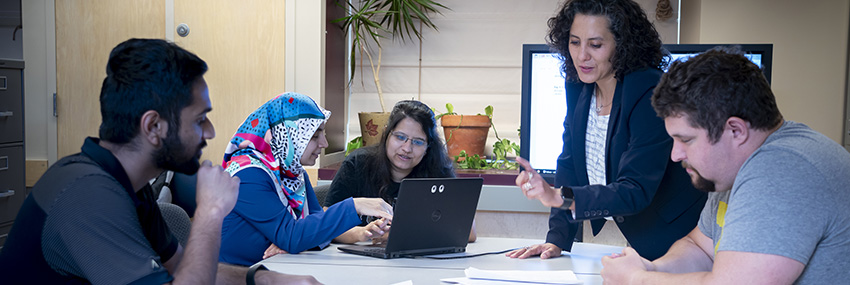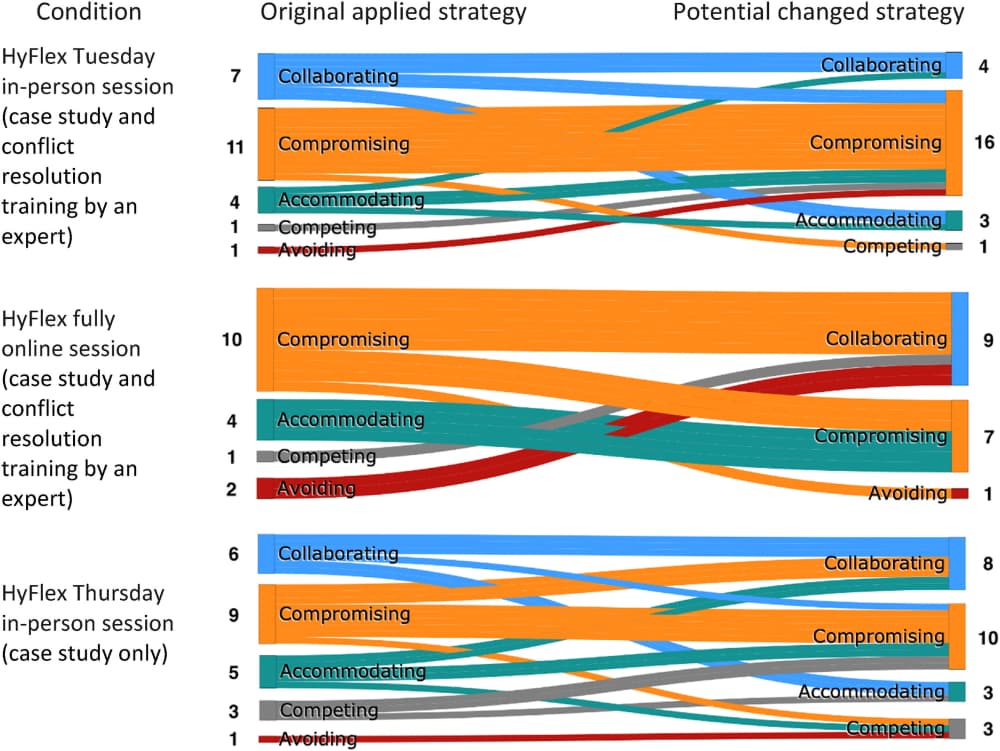
Editor’s note: the following summary is based on “Teamwork facilitation and conflict resolution training in a HyFlex course during the COVID-19 pandemic,” published in the Journal of Engineering Education in January 2022.
Teamwork facilitation and conflict resolution are vital skillsets in any higher education classroom. Add a global pandemic and virtual instruction to the mix, and these skills become much more challenging to teach and evaluate. For a multidisciplinary team of researchers at Purdue University’s Polytechnic Institute — Alejandra J. Magana, the W.C. Furnas Professor in Enterprise Excellence, Tugba Karabiyik, postdoctoral associate, Paul Thomas, graduate teaching assistant, Aparajita Jaiswal, graduate research assistant, and Viranga Perera, postdoctoral research assistant — and James Dworkin, professor of management, this unique situation also presented an excellent research opportunity.
The research team’s literature review identified a need for improved strategies for teaching teamwork skills in higher education, particularly in engineering education. Ultimately, their research evaluated the effectiveness of three teaching strategies in facilitating teamwork in a systems analysis and design course offered during the COVID-19 pandemic:
- Offering a HyFlex version of the course. Due to COVID-19, a systems analysis and design course at the Purdue Polytechnic Institute was changed to offer a fully online version of the course in parallel to the in-person section. Students from the online section joined the class synchronously via web conferencing software and attended the lecture together with the in-person students. In addition, when students were unable to attend class in person, they were provided with the link to join the class online. Additionally, all lectures, notes, examples and other class materials were uploaded into the learning management system for easy student access.
- Facilitating scheduled online teamwork sessions. Students attended six mandatory teamwork sessions, attended by a TA to assist with questions or conflict, and also had the option to join additional web conferencing teamwork sessions (via Zoom) to work on their project or other course assignments.
- Providing conflict resolution training to assist teams in overcoming collaboration challenges. This training represented a new component in the systems analysis and design course, and the research team tested two different approaches: After reading an assigned case study on teamwork challenges and coping strategies, students in one section of the course received live conflict resolution training delivered by an expert in collective bargaining, negotiation and dispute resolution. Students in the second section read the same case study, but did not receive live training.
- It is important to note that this research also encompassed a pre-pandemic course, allowing researchers to compare data from the fall 2019 semester, in which an in-person active learning strategy was used, to data from the fall 2020 semester, in which the same course followed the previously described HyFlex delivery model due to COVID-19 requirements and concerns. During each semester, all students were required to work in four- or five-person teams, and the fall 2020 semester also offered optional, virtual teamwork sessions.
HyFlex compared to in-person course delivery
Data for the project were collected throughout each semester in the form of course assignments. Data analysis included evaluation of team academic performance, individual academic performance, team self- and peer assessment, team collaboration strategies, and team conflict resolution strategies.
Findings indicate that a HyFlex course implementation provided students with a comparable learning experience to traditional, in-person course delivery. However, the study identified a need for learning strategies and supports that can improve social interactions among HyFlex fully online students to enhance social presence in an environment that may include low engagement levels, technical difficulties, and even additional work for faculty.
Team conflict resolution strategies, derived from individual student reflections, were collected only for the fall 2020 semester in order to evaluate an instructional intervention responding to instructional changes due to the COVID-19 pandemic. Data collected suggests an overall increase in the number of HyFlex students who adopted collaborating and compromising conflict resolution modes; among those same students, researchers noted an overall reduction in the number of students who would have applied an accommodating or avoiding conflict resolution mode.

Overall, findings from the study indicate that cooperative learning pedagogy can help teams function better, which is consistent with previous literature reviewed by the researchers. Specific training can boost teamwork skills even in this virtual environment to improve team behaviors, performance and outcomes. This research project demonstrated that HyFlex students, particularly those experiencing their coursework fully online, can have improved learning experiences by enhancing their social interaction and engaging in conflict resolution training.
Future implementations of the course at Purdue will take advantage of lessons learned during the COVID-19 pandemic and will include virtual working space, file-sharing capabilities, and regular in-class sessions on teamwork facilitation, mediation and conflict resolution training.
Learn more about this study by reading the complete Journal of Engineering Education article.
